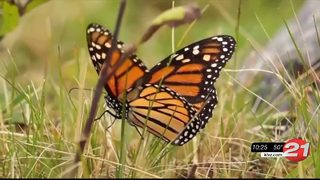Merkley intros bill to save western monarch butterflies

Key to agriculture, edging closer to extinction: 'Urgent solutions' needed
WASHINGTON (KTVZ) -- Sen. Jeff Merkley (D-OR and Reps. Jimmy Panetta (D-CA-20), Salud Carbajal (D-CA-24), Rodney Davis (R-IL-12), and Rob Woodall (R-GA-7) led the introduction Thursday of the Monarch Action, Recovery, and Conservation of Habitat (MONARCH) Act.
This bipartisan, bicameral legislation would provide urgent protections for the struggling western monarch butterfly, a pollinator that is integral to supporting American agriculture and whose population has dropped by 99% since the 1980s.
The legislation is cosponsored by Sens. Kamala Harris (D-CA), Cory Booker (D-NJ), and Sheldon Whitehouse (D-RI) in the Senate, and Reps. Alcee Hastings (D-FL-20), Jerry McNerney (D-CA-9), Chellie Pingree (D-ME-1), Mike Thompson (D-CA-5), and Joe Courtney (D-CT-2) in the House.
“As the western monarch butterfly comes closer and closer to extinction, we don’t just risk losing these beautiful creatures—we also face an increasing threat to American agriculture and our food supply,” said Merkley. “This is an urgent issue that requires urgent solutions. That’s why we must do everything we can to implement experts’ conservation plans and save these species before time runs out.”
"My district on the central coast of California is home to four of the top 10 high priority overwintering sites for western monarch butterflies. Sadly, as climate change continues to degrade their habitat, we have seen a huge decline in the number of monarchs on the Central Coast and along their migratory path," said Rep. Panetta. "The MONARCH Act will provide critical federal investment in the activities needed to save the Western Monarch butterfly population from extinction. By actively restoring and protecting key monarch habitats, we can also help facilitate the conservation of other essential pollinators."
"Over the past 40 years, the monarch butterfly population has dramatically depleted. We can't let these important pollinators fall into extinction," said Rep. Carbajal. "Luckily, our MONARCH Act is a way to protect these butterflies and, in turn, uplift our Pacific coast environment. In my district in Pismo Beach, we have the largest overwintering site of monarchs in the state and our ecosystem needs a healthy monarch population. Our bipartisan MONARCH Act incentivizes communities to boost conservation and help this population soar. I'm proud to introduce this important bill with my colleagues today."
“Preserving our pollinators is vital to our ecosystem,” said Rep. Davis. “Their extinction would threaten agriculture and therefore, our food supply. As a co-chair of the Pollinator Caucus, I’m proud to support bipartisan solutions, like the MONARCH Act, which would invest in projects to protect the western monarch butterfly.”
“I appreciate the House Pollinator Protection Caucus’ work to bring attention to and propose solutions, like this bill, that address the challenges associated with the decline in pollinators across the country,” said Rep. Woodall. “Pollinators such as the Monarch Butterfly are vital to our ecosystem, and to avoid the loss of this species, we have to be on the offensive and take all necessary precautions.”
The U.S. Department of Agriculture estimates that approximately 35% of the world’s food crops depend on pollinators for survival. But years of climate chaos, habitat loss, and disease are pushing pollinators like the monarch butterfly to the brink of extinction.
The MONARCH Act would help meet the critical need for urgent species recovery efforts by authorizing $62.5 million for projects aimed at conserving the western monarch. The legislation authorizes an additional $62.5 million to be spent by the National Fish and Wildlife Agencies to implement the Western Monarch Butterfly Conservation Plan, which was prepared by the Association of Fish and Wildlife Agencies in January of last year. The $62.5 million in funding for each effort would be divided into five annual installments of $12.5 million.
“Western monarch butterflies could be the next victims of the extinction crisis without immediate help,” said Stephanie Kurose, endangered species policy specialist with the Center for Biological Diversity. “Future generations deserve a chance to see these beautiful black and orange butterflies in backyards across the West. Sen. Merkley and Reps. Panetta and Carbajal’s legislation gives them a fighting chance.”
“Western monarch populations have fallen by more than 99% in the last three decades and it is vital that we maximize conservation efforts to recover the species,” said Scott Black, Executive Director of the Xerces Society for Invertebrate Conservation. “That is why Xerces strongly supports the Monarch Action, Recovery, and Conservation of Habitat Act of 2020, as it would provide essential funding to help protect and restore habitat for these incredible animals.”
“With so many insect species barreling towards extinction, we need to protect and expand pollinator habitat now, more than ever,” said Jason Davidson, food and agriculture campaigner with Friends of the Earth. “The MONARCH Act would be a giant step towards protecting the pollinators we rely on for our food system. Thank you to Senators Merkley, Harris, Booker, and Whitehouse, and to the House sponsors of this bill, for their leadership on pollinators.”
The legislation is endorsed by the Center for Biological Diversity, Xerces Society for Invertebrate Conservation, National Wildlife Federation, Monarch Joint Venture, Friends of the Earth, Western Association of Fish and Wildlife Agencies (WAFWA), MonarchAlert, California Association of Zoos and Aquariums (CAZA), San Diego Zoo Global, City of Pacific Grove, CA, Santa Clara Valley Habitat Agency, Charles Paddock Zoo, Occidental Arts and Ecology Center, Bees N Blooms, Safari West, Naturedigger, Butterfly Farms, Malibu Monarch Project, Aerulean Plant Identification Systems, Northwest Center for Alternatives to Pesticides, People and Pollinators Action Network, Northeast Organic Farming Association/Massachusetts Chapter, Toxic Free NC, Central Maryland Beekeepers Association, Pollinate Minnesota, Pennies for Monarchs, the Burroughs Audubon Society of Greater Kansas City, and Unite the Parks.
Today’s announcement builds on a series of recent actions undertaken by Senator Merkley to revive the populations of western monarchs and other pollinators, like honeybees—including the introduction of the bipartisan Monarch and Pollinator Highway (MPH) Act of 2019, which would establish a federal grant program to assist with the implementation of pollinator-friendly practices on roadsides and highway rights-of-way.
The full bill text of the MONARCH Act is available here.




